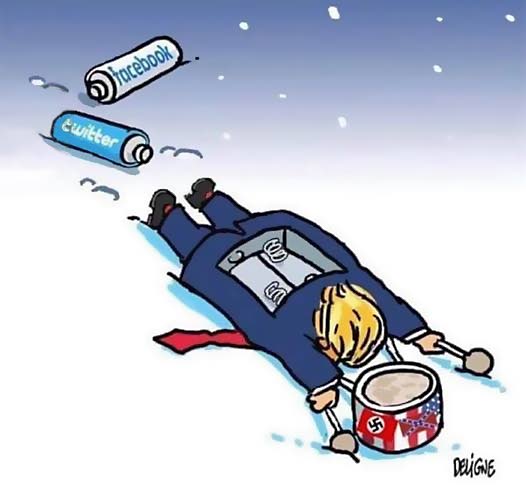What big tech ban on Trump means for free speech

Articles, opinion pieces, interviews and letters to the press have begun to proliferate, analysing, and generally not in a positive way, the decision of the big internet companies to block any messaging or tweets from, as of yesterday afternoon, former US president Donald Trump.
The objections have not come only from his diehard political supporters and his lawyers, who still stand to make a fair amount of money out of defending him, but also from people who have never have been in agreement with him, his politics, his morals, ethics or intentions.
What they object to is the curtailment of his, or anyone else’s right to free speech. Frequent references are made to constitutional rights and, beyond constitutional rights in those countries that have constitutions, to universal human rights as the basis for the principles of democracy.
I am not convinced that democracy in the sense of decisions being made based on equality – the "one human, one vote" concept – has ever existed, least of all in the United States. It doesn’t exist in any religious organisation I know of. Certainly not in educational institutions and, as if “democracy” and “freedom” are equated, it does not exist in any political, commercial or industrial relations system I know of. Democracy is an ideal to aim at, a goal to pursue, not a reality in place to point at.
I recall the words of Arthur Schlesinger Jr in defence of democracy which are coming to the fore again: "If popular government is about anything, it is about the unfettered right of voters to choose their leaders.”
I used to believe we had that right here until I witnessed the burgesses of La Brea being refused thrice the right to choose Robert Le Hunte as their political representative.
As for freedom of expression? Police charging into the Express offices to confiscate documented sources of information relevant to expose monetary evidence of a felony charge against a senior police officer comes under the rubric of human rights concerns as well.
In every generation, in every country, every human right is under pressure and threat by those in power who want to ensure that they, and they alone, stay in power.
Is the social-media blanking of Trump one of these? Or is it a legitimate issue of the application of established standards on which an organisation is founded?
Freedom of the press is a right enshrined in our Constitution. Freedom of speech, whether written, spoken, tweeted or e-mailed, is not “unfettered,” however. Every country recognises laws of libel and slander which refer to false “facts” or statements published and deliberately intended to defame the character of another person or institution as "a corporate person." Publication is normally accepted by the courts as the act of making something known to a person, or persons, other than the victim.
In the case of slander, it is defamation spoken out loud to be heard by other people, or said electronically via loudspeaker, or even in song. In the case of libel (ie in writing), this can be pen-and-ink, typewritten, printed through the media or electronically via Twitter, blog, e-mail or other means.
These are felonies in law, in case you are thinking of trying it even though you know it is not true, but you are doing it just for spite. If it is proven false, the victim can demand monetary compensation, which the courts have been known to grant.
As noted, jurist Lord Atkin famously pointed out, “Justice is not a cloistered virtue: she must be allowed to suffer the scrutiny and the respectful, even though outspoken, comments of ordinary men.”
Neither, it must be pointed out, are human rights “cloistered.” Freedom of speech, if it is used to incite violence, as in the many instances where it has been used to egg someone on to commit suicide, or murder, is still punishable by the death penalty. Laws exist against inciting violence. Hitler, a most eloquent and persuasive orator, was very good at it. If you have that skill and are a political or military leader, I gather that it can be quite effective. Robert Bruce, the famous Scottish military chieftain, led his clan of thousands into war after war through his oratorical skills.
Many a trade union leader has persuaded followers to strike using those skills as well. Words in the mouth of an orator are like the traditional pharmacists’ knife: they can cut both ways, used for good or for evil.
And words have consequences. Obscenity, cursing, vile and insulting words used at work against a manager are regarded as insubordination. An insult need not be obscene to be counted as insubordination. A loud steups in response to a supervisor’s request can do it, as in a 1970s Industrial Court award of sustained disciplinary action against an arrogant employee who steupsed at a manager, whereas much saltier words exchanged between stevedores and longshoremen on the docks was only termed “colourful shop floor language” and did not fall under the term “abusive,” although the words were obscene.
The intention is situational and relates to the cultural context. The classic Lawrence of Arabia curse – "Thy mother mated with a scorpion” – may not be regarded as an incitement to violence any more, but I have been told that, in my grandfather’s day, it has led to death.
The human rights listed in our Constitution and in the UN Declaration of Human Rights are the basis for many a claim of entitlement. But they are never absolute.


Comments
"What big tech ban on Trump means for free speech"